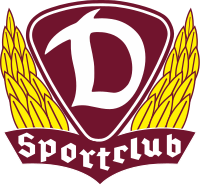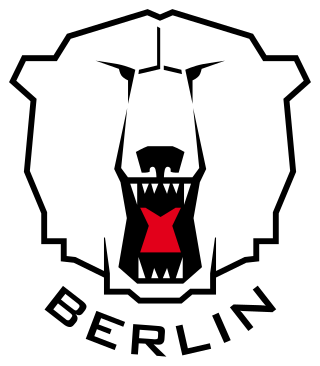
Eisbären Berlin is a professional ice hockey team based in Berlin, Germany. The team competes in the Deutsche Eishockey Liga (DEL), the highest level of play in professional German ice hockey, and is also one of the league's founding members. The Eisbären have won the DEL championship more often than any other team, with eight DEL championships as of the 2020–21 season. They won the German ice hockey cup in 2008 as well as the European Trophy in 2010. Before reunification the team won the East German ice hockey championship 15 times as SC Dynamo Berlin.
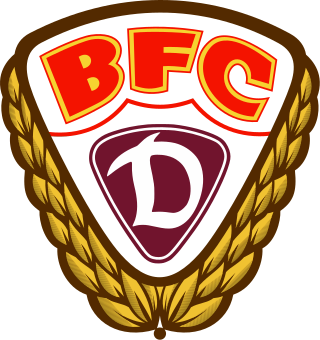
Berliner Fussball Club Dynamo e. V., commonly abbreviated to BFC Dynamo or BFC, alternatively sometimes called Dynamo Berlin, is a German football club based in the locality of Alt-Hohenschönhausen of the borough of Lichtenberg of Berlin.

Sportforum Hohenschönhausen, officially named Sportforum Berlin, is a multi-purpose sports complex in the locality of Alt-Hohenschönhausen of the borough of Lichtenberg in Berlin. The Sportforum was named Dynamo-Sportforum during the East German era.
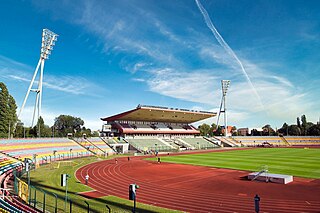
The Friedrich-Ludwig-Jahn-Sportpark is a multi-purpose sports complex located in the western part of the locality of Prenzlauer Berg in the borough of Pankow in Berlin. The sports complex covers an area of approximately 22 hectares and comprises several facilities. The main building is the Friedrich-Ludwig-Jahn-Stadion. The stadium is the third-largest stadium in Berlin, after the Olympiastadion and the Stadion An der Alten Försterei, with a capacity of approximately 20,000 seats, of which 15,000 are covered. Currently, the main tenants of the stadium are VSG Altglienicke and Berlin Thunder. Friedrich-Ludwig-Jahn-Sportpark was the venue for the 2018 World Para Athletics European Championships.

Lutz Eigendorf was a German professional footballer who played as a midfielder.

Football in Berlin, the capital of Germany, has a long history. The city contributed 24 of the 86 founders of the DFB, the German Football Association. The DFB Cup Final has been held every year at the Olympiastadion since 1985.

The Sportvereinigung Dynamo was the sport association of the security agencies of former East Germany.
Günter Krüger is a German judo athlete, who competed for the SC Dynamo Hoppegarten / Sportvereinigung (SV) Dynamo. He won medals at international competitions.

Jürgen Bogs is a German football coach who led BFC Dynamo to ten consecutive DDR-Oberliga titles from 1979 to 1988. Bogs was a youth coach at BFC Dynamo before becoming the coach of the first team in 1977. The ten consecutive league titles won by BFC Dynamo under Bogs is an achievement that has never been matched by any other coach in European club football.
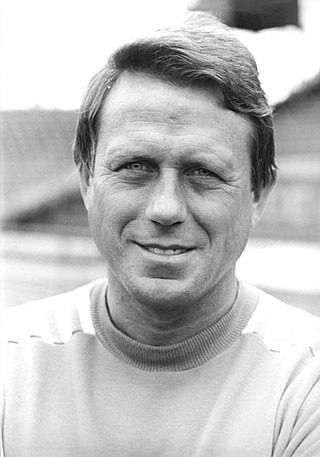
Werner Voigt was a German football coach and player.
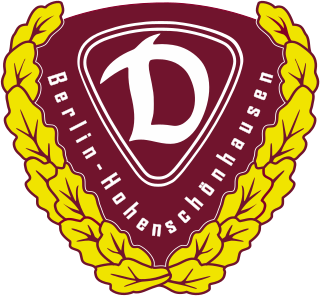
SG Dynamo Hohenschönhausen was an East German sports community from Berlin, affiliated to SV Dynamo. The sport community offered a wide range of sports. Its football departement was active from 1953 and until 1966.
A sports club (SC) was a specially promoted sports club for elite sport in the East German sports system. The sports clubs emerged in East Germany after 1954. They were originally founded by the so-called sports associations (SV), which served as umbrella organizations for the sports communities (SG) or enterprise sports communities (BSG) of the different trade union areas in East Germany. The East German sports management then tightened up the system in the early 1960s and instead set up regional district sports clubs. The sports clubs existed in this form until the end of 1990, when they were either dissolved or given new legal statuses based on the West German model. The system of sports clubs came to prove itself in view of the very large number of medals that athletes in East Germany won in the Olympic games and in European and World Championships.
The 1984–85 FDGB-Pokal was the 34th East German Cup. For the second consecutive year, Dynamo Dresden beat BFC Dynamo in the final, securing their sixth title.

The Berlin derby is the name given to any association football match between two clubs in Berlin, Germany, but has more recently referred to the derby between 1. FC Union Berlin and Hertha BSC.
SG Volkspolizei Potsdam, also known as SV Deutsche Volkspolizei Potsdam was an East German sports community based in Potsdam, Bezirk Potsdam. The club was founded in 1948 and its football department existed until 1952. Like other sports communities associated with the Volkspolizei, it was incorporated into SV Dynamo in 1953. The club was reformed as SG Dynamo Potsdam.
The 1989–90 season was tumultuous for BFC Dynamo. The East German regime faltered and parts of the Berlin Wall were opened on 9 November 1989. Forward Andreas Thom became the first player in the DDR-Oberliga to leave for the West German Bundesliga. The dismantling of the champion team from the 1980s was now well underway. The Stasi was dissolved and the club thus lost a major sponsor. The East German Ministry of the Interior declared that it was only prepared to support the club until the end of the 1989–90 season. The club changed its name to FC Berlin on 19 February 1990, in an attempt to distance the club from the Stasi. The number of spectators dropped drastically. FC Berlin finished the 1989-90 DDR-Oberliga in fourth place and failed for the first time to qualify for a European competition. Also Thomas Doll, Frank Rohde and Rainer Ernst left for the Bundesliga after the season.
BFC Dynamo finished the 2003–04 Verbandsliga Berlin in first place and won promotion back to the NOFV-Oberliga Nord. Mario Weinkauf was elected as the new club president on 18 June 2004. His vision was a club that was "managed seriously from a sporting and financial perspective". Former professional player Christian Backs became the new coach for the 2004–05 season. Rajko Fijalek served as assistant coach and former professional goalkeeper Bodo Rudwaleit as goalkeeping coach. Central players in the team were Robert Rudwaleit, Nico Thomaschewski, Dennis Kutrieb, Jörn Lenz and Danny Kukulies. BFC Dynamo finished is first season in the NOFV-Oberliga Nord, since returning from the insolvency crisis, in sixth place.
